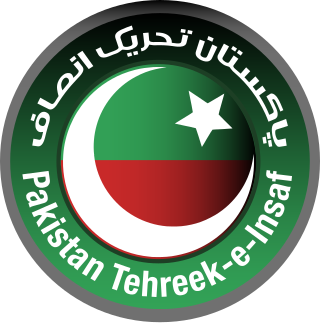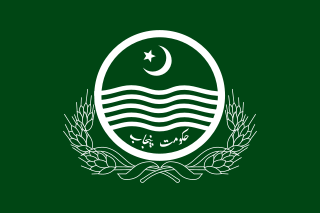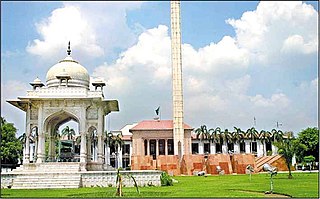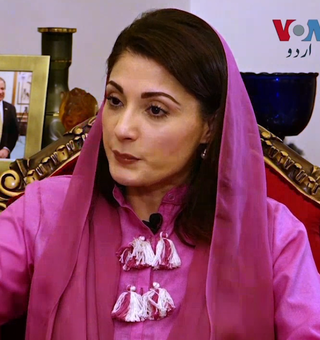
The Pakistan Tehreek-e-Insaf is a political party in Pakistan established in 1996 by Pakistani cricketer and politician Imran Khan, who served as the country's prime minister from 2018 to 2022. The PTI ranks among the three major Pakistani political parties alongside the Pakistan Muslim League–Nawaz (PML–N) and the Pakistan People's Party (PPP), and it is the largest party in terms of representation in the National Assembly of Pakistan since the 2018 general election. With over 10 million members in Pakistan and abroad, it claims to be the country's largest political party by primary membership, as well as one of the largest political parties in the world.

Chaudhry Parvez Elahi Warraich is a Pakistani politician who is the former Chief Minister of Punjab. He was a member of the Provincial Assembly of the Punjab from August 2018 till January 2023, when he, as chief minister, dissolved the assembly. In 2023, he left the Pakistan Muslim League (Q) and joined Pakistan Tehreek-e-Insaf (PTI) along with his son, Moonis Elahi, and 10 other former PML(Q) MPAs over political rifts with the party president and cousin, Chaudhry Shujaat Hussain. He was appointed president of the PTI. He was the former president of the Punjab Division of the PML(Q).

The Provincial Assembly of the Punjab is a unicameral legislature of elected representatives of the Pakistani province of Punjab, which is located in Lahore, the provincial capital. It was established under Article 106 of the Constitution of Pakistan, having a total of 371 seats, with 297 general seats, 66 seats reserved for women and 8 reserved for non-Muslims.

Mian Muhammad Shehbaz Sharif is a Pakistani politician and businessman who is currently serving as the 23rd prime minister of Pakistan since March 2024, having previously served in the post from April 2022 to August 2023. He has also served as the president of the Pakistan Muslim League (N) (PML-N). Previously in his political career, he served as the chief minister of Punjab three times, making him the longest-serving chief minister of Punjab.

The chief minister of Punjab is the head of government of the Pakistani province of Punjab. The chief minister leads the legislative branch of the provincial government, and is elected by the provincial assembly for Provincial Assembly. Given that they have the confidence of the assembly, the chief minister's term is for five years and is subject to no term limits. Maryam Nawaz Sharif is the current elected chief minister of Punjab who won her seat in the 2024 general elections.

Muhammad Hamza Shahbaz Sharif is a Pakistani politician, businessman, and the eldest son of current Prime Minister Shehbaz Sharif. He served as the Leader of the Opposition in the Provincial Assembly of the Punjab from September 2018 to April 2022, and resumed this role on 20 October 2022 and continued until the dissolution of the assembly. He briefly held the position of Chief Minister of Punjab from 30 April 2022 to 26 July 2022. His tenure as a member of the Provincial Assembly of the Punjab spanned from August 2018 to January 2023. Prior to this, he was a member of the National Assembly of Pakistan from June 2008 to May 2018.

General elections were held in Pakistan on 25 July 2018 to elect the members of the 15th National Assembly and the four Provincial Assemblies. The three major parties were Pakistan Tehreek-e-Insaf (PTI), led by Imran Khan, the Pakistan Muslim League, led by Shehbaz Sharif, and the Pakistan People's Party, led by Bilawal Bhutto. The PTI won the most seats in the National Assembly but fell short of a majority; the party subsequently formed a coalition government with several smaller parties. At the provincial level, the PTI remained the largest party in Khyber Pakhtunkhwa (KP); the Pakistan Peoples Party (PPP) retained its dominance in Sindh; and the newly formed Balochistan Awami Party (BAP) emerged as the largest party in Balochistan. In Punjab, the result was a hung parliament, with the Pakistan Muslim League (N) winning the most seats. However, after several independent MPAs joined the PTI, the latter became the largest party and was able to form a government.

Malik Nauman Ahmad Langrial is a Pakistani politician who was a member of the Provincial Assembly of the Punjab from August 2018 till May 2022.

Provincial elections were held in the Pakistani province of Punjab on to elect the members of the 17th Provincial Assembly of the Punjab on 25 July 2018, alongside nationwide general elections and three other provincial elections in Sindh, Balochistan and Khyber Pakhtunkhwa. The remaining two territories of Pakistan, AJK and Gilgit-Baltistan, were ineligible to vote due to their disputed status.
Muhammad Tahir Randhawa is a Pakistani politician who had been a member of the Provincial Assembly of the Punjab from August 2018 to May 2022.

Sardar Usman Ahmed Khan Buzdar is a Pakistani politician who was Chief Minister of Punjab from 20 August 2018 to 30 April 2022, when he was roundly criticised for alleged incompetence. Buzdar was a member of the Provincial Assembly of Punjab from August 2018 till January 2023 representing the Pakistan Tehreek-e-Insaf (PTI). Belonging from a Baloch family, he is a minor feudal and the Tumandar of the Baloch tribe Buzdar, since April 2019. He served as Tehsil Nazim of Tehsil Tribal Area from 2001 to 2008.

In April 2022, a no-confidence motion against Imran Khan led to his removal as the prime minister of Pakistan. Based largely on the Westminster system of legislature, the prime minister commands confidence of the majority of the lower house of Parliament, the National Assembly of Pakistan, under clause (2A) of Article 91 of the Constitution. Numerous opposition parties joined forces to file the motion of no confidence against Imran Khan in the National Assembly. It ultimately led to the removal of Khan from office as a majority passed the motion in the Lower House.
Muhammad Aun Saqlain Chaudhry is a Pakistani politician who has been a member of the National Assembly of Pakistan since February 2024. He was also an advisor to the Prime Minister of Pakistan Shehbaz Sharif on tourism and sports from April 2022 to August 2023.

By-elections were held in Punjab, Pakistan on 17 July 2022 to elect 20 members of the Provincial Assembly of the Punjab. The Pakistan Tehreek-e-Insaf won a landslide victory on 15 of those 20 seats, leading to the collapse of Chief Minister Hamza Shahbaz's PML(N)-led coalition government, as it became 7 seats short of a majority.

Provincial elections were held in the Pakistani province of Punjab on 8 February 2024 to elect a new provincial legislature. On 5 August 2023, the results of the 2023 digital census were approved by the Council of Common Interests headed by Prime Minister Shehbaz Sharif. Therefore, elections have been delayed for several months, as new delimitations will be published on 14 December 2023, as announced by the Election Commission of Pakistan (ECP). On 2 November 2023, the ECP announced, in agreement with the President of Pakistan, Arif Alvi, that the elections will be held on 8 February 2024. The election was held concurrently with nationwide general elections and other provincial elections.

Syed Mohsin Raza Naqvi is a Pakistani politician and businessman. He is a senator and serves currently as Interior Minister of Pakistan since 11 March 2024 and the Chairman of the Pakistan Cricket Board since 6 February 2024.

The 2022–2023 Pakistan political unrest was a series of political crises after the ousting of former prime minister Imran Khan through a no-confidence motion in April 2022. The crises began in 2022 when the opposition joined hands and submitted a no-confidence motion against Imran Khan's government in the National Assembly. Prime Minister Imran Khan urged the Pakistani establishment not to stay neutral and play its role to save his government and not let historical rival politicians with alleged corruption charges take over, but the establishment refused.

The Buzdar provincial government was the Government of Punjab, Pakistan led by Chief Minister of Punjab, Sardar Usman Buzdar and the Pakistan Tehreek-e-Insaf (PTI) from 27 August 2018 to 1 April 2022. His cabinet saw many prominent ministers from the First Parvez Elahi provincial government such as Mian Aslam Iqbal, Aleem Khan and Sibtain Khan. The cabinet also saw reshuffles, while Yasmin Rashid, a politician and gynecologist health expert was granted all health portfolios. Hashim Jawan Bakht, a graduate from the McGill University was also made Minister of Finance.

















